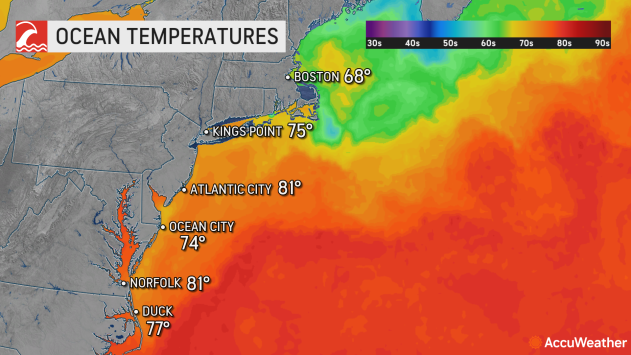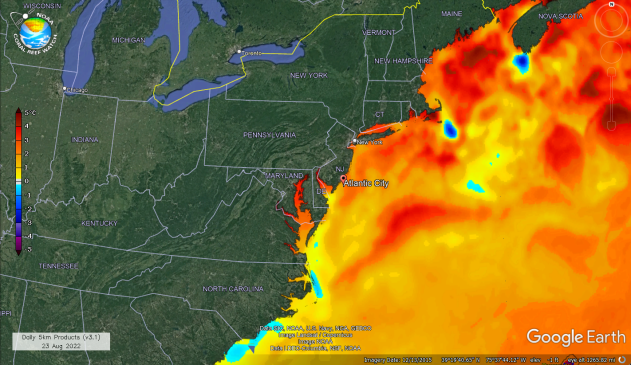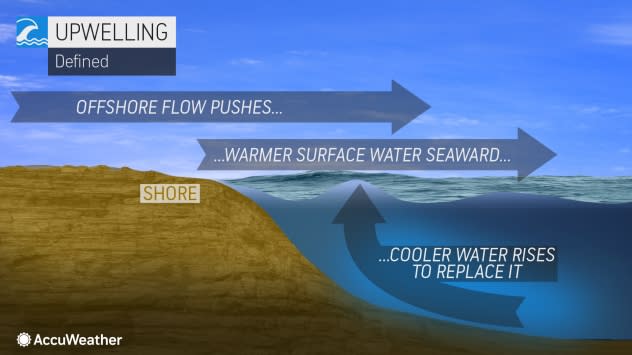Water at Jersey shore surges to nearly 84 degrees
The ocean waters off of the Jersey Shore and other areas of the Northeast experienced two different temperature extremes over the last few weeks -- record-breaking warm water that was previously bone-chilling cold.
"As of Thursday morning, Atlantic City's water temperature was a balmy 81 degrees, 9 degrees above the normal number you'd see in early August," said AccuWeather Senior Weather Editor Jesse Ferrell.
That was by far the winner for ocean warmth, but other locations that were significantly above their early August normal Thursday morning included Eastport, Maine (+6), Kiptopeke, Virginia (+5), Duck, North Carolina (+4), Montauk, New York (+4), Cape May, New Jersey (+3.5), Portland, Maine (+3.5) and New Haven, Connecticut (+3.1).
On Tuesday, a NOAA sensor measured the waters near Atlantic City even higher at 83.8 degrees Fahrenheit. That reading surpassed the previous record of 83.3 degrees, set on Aug. 10, 2016. Two weeks earlier, water temperatures at the same sensor hovered around 55 degrees.
But why and how did it get so warm so fast? Through a process called downwelling, winds blowing from the ocean pushed warm water on the surface toward land, allowing the cooler water already present to sink to the bottom.
It's normal for ocean temperatures to be on the warmer side right now -- late August is usually when those temperatures reach their peak -- but it's uncommon for them to be quite this warm. The peak water temperature in Atlantic City for Aug. 2021 was 79.7 degrees.
This week, the waters off Key West, Florida, are at 88.5 degrees. Duck, North Carolina, in the Outer Banks, is an even lower 77 degrees. For those in the Northeast looking for one last summer vacation, why travel when you could stay home, where the winds brought up all the heat you could want?
 |
Ocean temperatures as of the morning of Aug. 25, 2022. Atlantic City was 9 degrees F above normal. |
That's exactly what some people near the Jersey shore did.
"It's been really cold this summer," Marissa Delpalazoo of Ventnor City told WPVI. "So, today is refreshing that you can actually put your foot in there now."
The local TV station reported many beachgoers have waited for this since the beginning of the month.
 |
This July 9, 2018, photo shows beachgoers on the shoreline of Atlantic City, N.J. In late August of 2022, the water temperature in Atlantic City set an all-time record high at almost 84 degrees. (AP Photo / Wayne Parry) |
"This year, we could hardly get past our ankles. It was 62 degrees the last couple weekends and weeks well into August," said resident Jim Calla.
Another reason the Atlantic is so hot might be the marine heat wave, the same one that fueled heavy rainfall across the Northeast in 2021, specifically in the New York City area. A marine heat wave is a prolonged period during which sea-surface temperatures are unusually high, according to the National Oceanic and Atmospheric Administration (NOAA). Ferrell said there had been yearly temperature anomalies since 2014, making for almost a decade-long marine heat wave.
When the surface is hot enough, it causes more water evaporation, which results in more clouds and, thus, more rain.
 |
Sea-surface temperature anomalies on Aug. 25, 2022, in degrees Celsius. Warmer colors indicate water that is warmer than normal. |
Further compounding this issue would be any potential hurricanes that could form in the Gulf of Mexico over the coming weeks and months. While August has been abnormally quiet in terms of tropical development, any storms that move north up the East Coast could pose flood risks.
But just like cool water can sink -- raising surface temperatures -- the reverse can happen, too. Upwelling occurs when winds pushing in the opposite direction send the warm waters out to the ocean and the cooler water sitting underneath it "wells up." Since cool waters typically have more nutrients, according to NOAA, upwelling can be a boon for the fishing industry.
 |
When winds push warmer surface water seaward, cooler water rises to replace it. This is known as upwelling. |
In late July and early August, when Atlantic waters should have approached their peak of low to mid-70s, the surface temperature dropped precipitously from about 77 degrees on July 19 to 64.6 degrees 12 hours later, according to The Philadelphia Inquirer. The temperature continued to drop to 56.5 degrees on July 22 and bottomed out at an uncomfortable 55.8 degrees on Aug. 10, according to the Inquirer.
The cold water kept many current vacationers and beach lovers from having summer fun. Some even said chilly ocean water was painful.
"I came down expecting it to be a bit warmer than it was, and it was a bit of a shock," Phil Tribe of Haddonfield told NBC4 New York, adding that the water felt "a little bit like daggers in your foot."
Want next-level safety, ad-free? Unlock advanced, hyperlocal severe weather alerts when you subscribe to Premium+ on the AccuWeather app. AccuWeather Alerts™ are prompted by our expert meteorologists who monitor and analyze dangerous weather risks 24/7 to keep you and your family safer.





